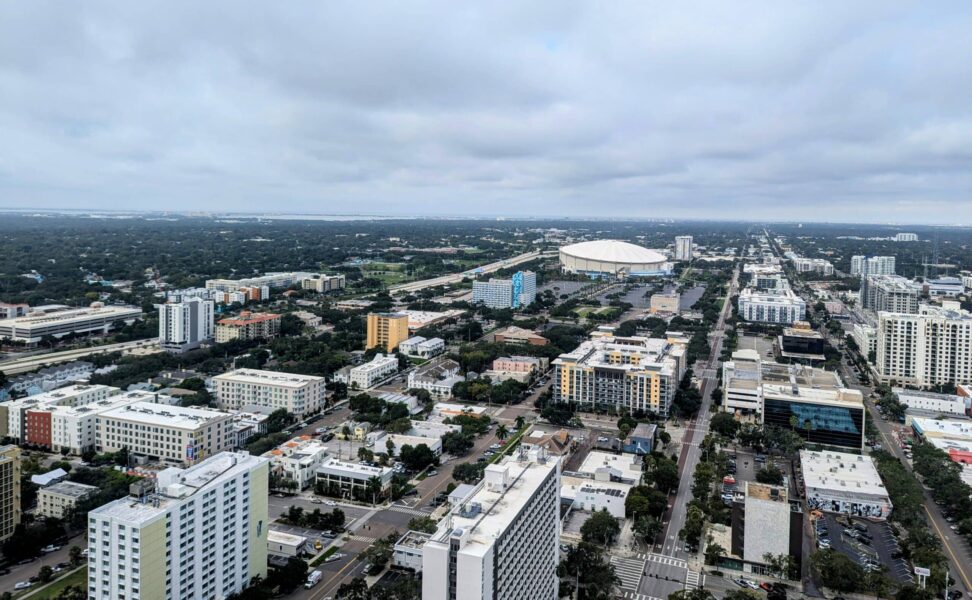The City of St. Petersburg will consider hiring the world’s oldest and largest network of cross-disciplinary land use experts to study the Historic Gas Plant site.
Home to Tropicana Field and a sea of surface parking lots in the heart of a land-scarce city, the roughly 86-acre area is also the subject of oft-contentious debate and several multi-billion-dollar redevelopment proposals. Councilmember Brandi Gabbard said Thursday that St. Petersburg lacks an unbiased, professional study on the Gas Plant’s best uses.
Gabbard also believes the Urban Land Institute (ULI) can provide that “guiding document” for city officials. Her colleagues unanimously agreed to discuss utilizing the think-tank’s local affiliate at a future committee meeting.
“I believe that this is an important step forward to making sure we have voices at the table who have that experience, but have no skin in the game,” Gabbard said. “They’re not here to make money off of this property.
“They are here to give us guidance so that we make sure we make the best deal, the best negotiation possible, for the residents of the City of St. Petersburg.”
The Tampa Bay Rays exited an arduously negotiated $6.5 billion redevelopment stadium deal in March. ARK Investment Management, Ellison Development and Horus Construction submitted a $6.8 billion vision for the site Oct. 3, and Council Chair Copley Gerdes told the Catalyst that it “checked a lot of boxes.”
Two key stakeholders expressed support for Gabbard’s proposal at Thursday’s meeting. Chris Steinocher, CEO of the St. Petersburg Area Chamber of Commerce, noted the city previously hired ULI Tampa Bay to help create a waterfront master plan.
He said the previous study provided “good data and opportunities for thinking differently.” While the Ark Ellison Horus proposal has “a lot of great ideas,” Steinocher said other groups could “have some great ideas, too.”
“What did we learn from getting the best master developer in Hines and the Rays that walked away from us?” Steinocher continued. “What do we want this to really do for us?”
Jason Mathis, CEO of the St. Petersburg Downtown Partnership, said a ULI study wouldn’t impede Mayor Ken Welch from potentially moving forward with the latest redevelopment proposal. “In fact, the ULI concept predates this bid by several months.”
“I believe the Ark Ellison team is hoping to work with ULI to refine their proposal no matter what,” Mathis added. “If you select their unsolicited bid.”

Ark Ellison Horus included a “Gas Plant Hall” in the latest proposal to reimagine the area. Rendering provided.
Mayor Ken Welch has prioritized fulfilling long-deferred promises to the thousands of Black residents and businesses displaced from the site in the 1980s. He is also up for reelection in 2026, and Gabbard recently confirmed her long-rumored candidacy.
She said the ULI report would help determine if “it’s even right to go with a master plan developer.” Welch is also considering letting the city lead efforts to build affordable senior housing and a new Woodson African American Museum of Florida on parcels recently retaken from the Rays.
“This is not to put aside anything that may be before the administration at this point,” Gabbard said. “This is to really give the city council some guidance … How can we really get the biggest return on our investment?”
Gabbard added that “anytime a developer comes to you, it is based upon the yield that they’re going to make on the property.” ULI Tampa Bay, which serves seven regional counties, will evaluate the site’s rich history, previous studies and city goals.
A ULI study was broached immediately after the Rays exited their redevelopment deal in March. Administrators received a presentation and proposal over the summer that “didn’t move forward, for whatever reason.”
Gabbard said Ark Ellison Horus has the same information. She wants the city to partner with the chamber and other organizations to split the study’s cost.
“It’s a pretty inexpensive study,” Gabbard said. “It’s only about $135,000.”
Councilmember Deborah Figgs-Sanders noted that she and colleagues frequently debate how a $10,000 or $15,000 appropriation could benefit other organizations. However, she will “always entertain a conversation” to see “what we could possibly gain.”
Councilmember Lisset Hanewicz said officials should first explore how a massive redevelopment might require additional services, including a new fire station. She supported Gabbard’s request to, hopefully, discuss “some of these basic things” with the administration.
“We’re not in discussions with ULI right now,” said City Administrator Rob Gerdes. “If this goes to committee, we’re happy to have the discussion.”
Council members unanimously approved Gabbard’s committee referral without setting a date.

